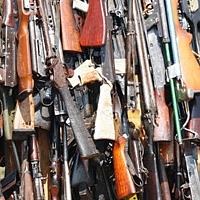(BRUSSELS) – Euro-MPs, debating in committee on a draft update of the EU firearms directive, voted Wednesday to introduce stronger controls on ‘blank-firing’ guns, to prevent them being converted to fire live ammunition.
The European Parliament’s Internal Market Committee’s amendments would ensure that any firearm which has been converted to firing blanks continues to be covered by EU gun control rules. This closes a legal loophole which became evident in the aftermath of last year’s terrorist attacks in Paris.
The EU firearms directive, in place since 1991 and amended in 2008, sets out the conditions under which private persons may lawfully acquire and possess guns or transfer them to another EU country.
Parliament’s rapporteur Vicky Ford MEP said the Commission’s proposed revision had prompted concerns about inadequate drafting and possible unintended consequences for law-abiding citizens: “We have tried to address the concerns voiced by citizens, to make sure that they can continue with their sports, military enactments and traditional hunting,”, she said.
EU countries will have to introduce stronger controls on “blank-firing” acoustic firearms, MEPs say. Any firearm which has been converted to firing blanks continues to be covered by EU law, due to the risks associated with them, under the committee amendments.
Several EU Member States have seen conversion of these firearms as a serious issue and many documented cases exist, according to Parliament’s Research Service. The MEPs says they want to close the legal loophole in the treatment of these weapons.
European standards to ensure that deactivation of all firearms is irreversible were introduced last November, but many technical issues would make them difficult to implement.
The Commission proposal would also have added many firearms used legally by hunters and sport shooters to the list of “Category A” firearms prohibited for civilian use. The Internal Market Committee text restricts Category A to firearms with specified characteristics, such as semi-automatic firearms capable of firing more than 21 rounds without reloading, if a loading device with a capacity exceeding 20 rounds is part of the firearm or is inserted into it, and certain folding or telescoping firearms.
Firearms commonly used for pest control, such as point 22 rifles, are not affected (these would be listed in “Category B”, firearms subject to authorisation). MEPs’ amendments also grant exemptions for military reservists, museums and collectors, under strict conditions.
A monitoring system for the issuance or renewal of authorisations, to be set up at Member State level, and new provisions on online/distance sales were also approved by MEPs. The maximum five-year duration of firearms certificates will not affect countries with a “continuous” monitoring system.
All information needed to trace and identify firearms will have to be recorded for an indefinite period and made accessible to all authorised authorities. MEPs also inserted rules requiring more efficient information exchange among member states.
Parliament’s negotiators now await the full Parliament’s approval before embarking on talks with the EU’s Slovak presidency after the summer break.
Further information, European Parliament
Subject file, with links to the procedure, timetable and other documents



